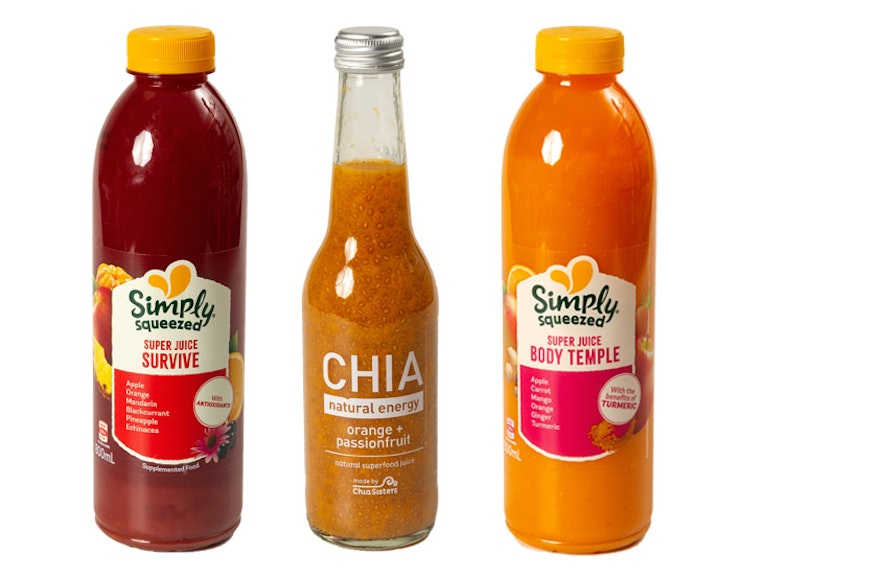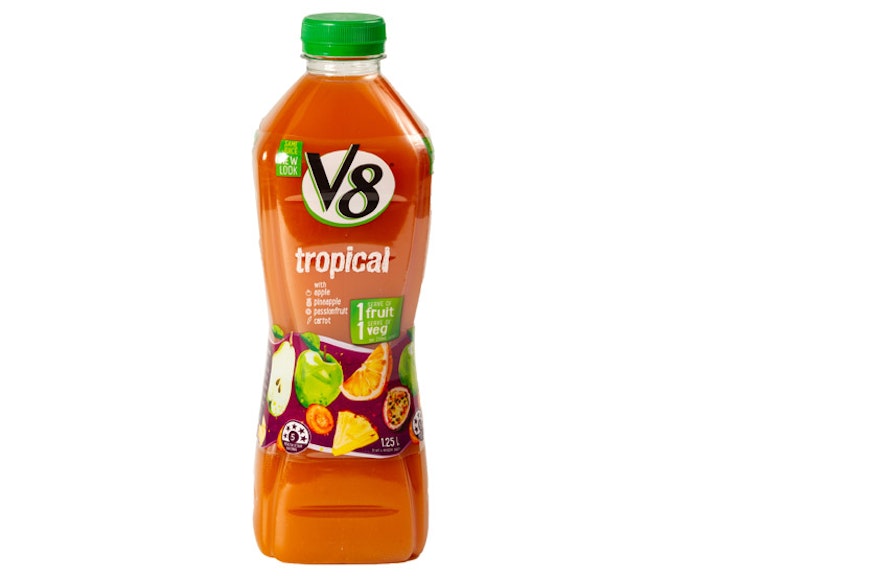
By Belinda Castles
Researcher | Kairangahau
If the cold weather has you feeling sluggish, could a jazzed-up juice be the solution? Manufacturers claim these tonics can improve your natural energy or immunity, but should you believe the hype?
There’s no shortage of juices pumped up with herbs, “superfoods”, or caffeine. For example, No Ugly Ginger Wellness Tonic is “crammed with scientifically proven gorgeousness”. Simply Squeezed Juices squeeze in echinacea and turmeric, while Monster Energy Juice packs a caffeine hit equivalent to two cups of coffee.
But don’t be fooled by the marketing and exotic ingredients. These drinks aren’t always a healthy choice. Of the nine juice-based drinks we assessed, five had more than four teaspoons of sugar in a 250ml glass.
Superfood claims
There are few things food marketers like more than slapping the word “super” on their products.
...you and your wallet probably won’t see any “super” benefit by
consuming these juices.
Chia Natural Energy Orange + Passionfruit claims to be a “natural superfood juice” to help you do more, be smart, have a good gut and stay strong. Simply Squeezed sells a “Super Juice” range, which has ingredients such as echinacea and turmeric – a spice getting plenty of airtime.

However, you and your wallet probably won’t see any “super” benefit by consuming these juices. The Simply Squeezed products in our table have more than six teaspoons of sugar per glass from the fruit and vege in the juices.
Dr Rachael McLean, University of Otago public health and epidemiology senior lecturer, said there’s no definition of a superfood – it’s simply used as a marketing tool.
“The most important thing is to consume a healthy diet by enjoying a variety of foods and making plain water your drink of choice,” she said.
The makers of Chia said they call their drink a “superfood” because it’s high in fibre and has more nutrients than other drinks, such as iron, calcium and Omega-3.
Tonics
“Tonic” drinks are defined as a substance taken to give a feeling of vigour or well-being. Whether you’ve indulged in the vino, had an “ugly sleep” or are stressed out, No Ugly Ginger Wellness Tonic boasts it can have you back to your “spunk-bubble self in no time”.
The No Ugly Ginger bottle claims the drink is “crammed with scientifically proven gorgeousness … stuff like enzogenol which just so happens to be nature’s most powerful antioxidant”.

When we asked the company for proof to back this claim, it said the bottle we bought had old labels. It didn’t have evidence to support the claim and had changed its labelling to “one of nature’s most powerful antioxidants”.
Its website also brags the drink can reduce tiredness or fatigue, and give improved neurological function and mental performance. The claims are related to its vitamin and mineral content, rather than the enzogenol.
No Ugly has less total sugar than the other drinks we looked at – partly because its main ingredient is water. But, as well as fruit juice concentrate, it contains three added sweeteners.
Aotea’s Immunity Tonic also gets on the wellness tonic bandwagon. The drink includes extracts of ginger, turmeric, olive leaf and echinacea. However, there’s no mention of how much of these ingredients you’re getting.
The same goes for Aotea’s Antioxidant tonic – it highlights the drink’s “super-high” omega-3 content, but doesn’t tell you how much you’re getting.
The Food Standards Code requires levels of nutrients to be specified when claims are made about them and the percentage of “characterising” ingredients in a product to be stated. We think herbal extracts are a characterising ingredient in Aotea tonics, so amounts should be listed on the label.
Five-a-day fraud

V8 Tropical claims to deliver one serve of fruit and one serve of vege in a 250ml glass. However, that glass also packs more than five teaspoons of sugar and only 0.5g of fibre. If you ate an apple and a carrot, you’d get nearly five grams of fibre and less sugar.
Ministry of Health healthy eating guidelines used to say juice could count as one serving. However, in 2015 this was amended in line with World Health Organization advice to reduce our intake of free sugars, including those from fruit juices and fruit juice concentrates. The ministry now recommends eating fresh fruit and drinking plain water.
V8 Tropical also boasts a five-star health rating. How does it manage that? One of the criticisms of the rating system is that different fruit and vege get different ratings and fruit juices can get a higher rating than whole fruit.
Caffeinated drinks
We also assessed two juice-based, caffeine-infused concoctions: Phoenix Organic Sparkling Energy Drink and Monster Energy Juice Pipeline Punch.
Per 250ml, both contained about the same amount of caffeine (about 80mg) as an espresso shot. The drinks also delivered a sizeable sugar hit – more than five teaspoons in 250ml of Phoenix and more than six in Monster Juice. The sugar comes from fruit juice concentrate, but Monster has added sucrose, dextrose and sucralose (an artificial sweetener).
Monster Energy Juice comes in a 500ml can so, if you down it in one go, that’s more than 12 teaspoons of sugar and a two-cup-of-coffee caffeine hit.
Products compared
What do the experts say?
Five of the drinks we looked at contained citric acid, which is also naturally present in oranges and other fruit. However, acidic and sugary drinks can damage your teeth.
New Zealand Dental Association spokesperson Dr Rob Beaglehole said ingredients such as vitamins or antioxidants don’t offset the harm sugary and acidic drinks can cause.
When it comes to fruit – eat it, don’t drink it.
“Regardless of if it’s a fruit juice or sugary concoction, dentists recommend drinking water or plain low-fat milk. When it comes to fruit – eat it, don’t drink it,” he said.
Dr Rachael McLean said there are other downsides to getting your nutrients from juice rather than whole foods.
“Eating whole fruit gives you the benefit of other nutrients found in the skin and pulp such as fibre. It’s also more filling than fruit juice, so will sustain you for longer. Fruit juices are often very concentrated, so you’ll consume the equivalent of many pieces of fruit in one go,” she said.
5+ A Day Charitable Trust project manager Carmel Ireland said juice doesn’t contribute to your 5+ due to the sugar and reduced fibre.
Then there’s the cost. The drinks we looked at cost up to $6.99 per glass. Dr McLean said you’re better off putting that money towards some plain old fruit and vegetables.
Health and nutrition claims
Nutrition and health claims are regulated by the Australia and New Zealand Food Standards Code.
Nutrition content claims are about the amount of certain nutrients or substances in a food, such as “good source of vitamin C”. These claims can be made even though a product may be high in sugar.
Health claims refer to a relationship between a food and health. There are two types of claims permitted:
General-level health claims refer to a nutrient, substance or food and its effect on general health and wellbeing. For example, vitamin C contributes to the reduction of tiredness and fatigue.
High-level health claims refer to a serious disease or a biomarker. For example, diets high in calcium may reduce the risk of osteoporosis.
There are more than 200 pre-approved general-level health claims and 13 pre-approved high-level health claims.
Health claims are only permitted on products that meet the nutrient profiling scoring criteria – that means health claims aren’t allowed on foods high in saturated fat, sugar or salt, without containing sufficient “positive” nutrients such as protein, fibre, and fruit or vegetable components.
But as our review of drink labels found, the rules don’t stop health claims turning up on drinks that contain a sizeable amount of sugar per serve. We think the code needs to be changed so that can’t happen.